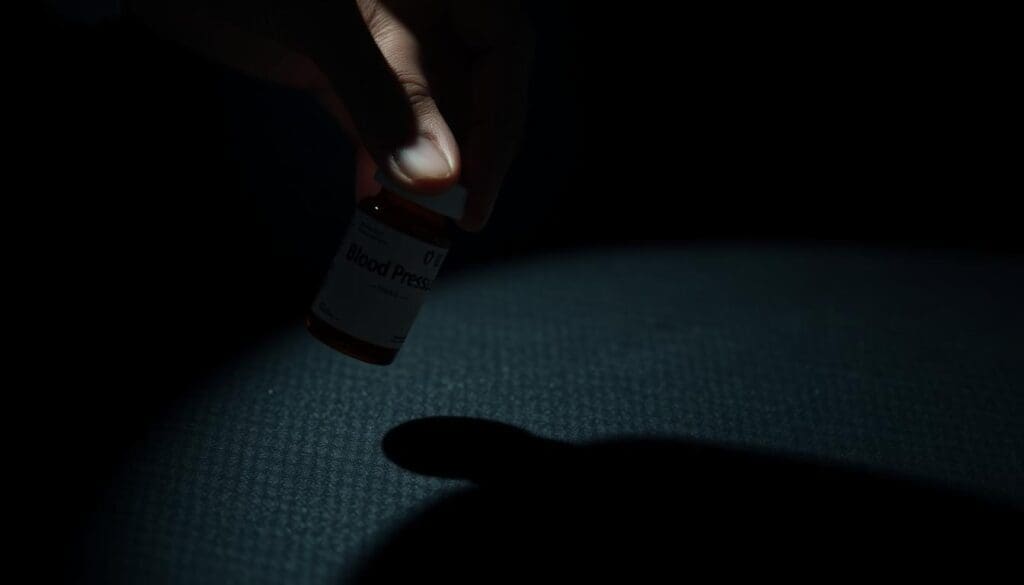
Learn about 7 common blood pressure medications that cause ED. Find out how they affect sexual function and what your alternatives are.
Blood pressure medications are key for managing high blood pressure. But, some types can harm sexual function, leading to erectile dysfunction (ED).
Studies show that some antihypertensive drugs are big culprits behind ED. This can make it hard for men to stick to their treatment plans and enjoy their lives.
It’s important to know which medications are riskier and find safer options. This helps men with high blood pressure keep their heart healthy without losing their sexual function.
Key Takeaways
- Certain blood pressure medications can cause erectile dysfunction.
- Thiazide diuretics, loop diuretics, and beta-blockers are known to contribute to ED.
- ACE inhibitors and ARBs are considered safer alternatives for hypertensive men.
- Understanding the risks associated with different medications can help men make informed decisions.
- Safer alternatives are available for men experiencing ED due to blood pressure medications.
The Connection Between Blood Pressure Medications and Erectile Dysfunction

Certain blood pressure medications can lead to erectile dysfunction. It’s important to know this to manage both high blood pressure and sexual health well.
How Common Is Medication-Induced ED?
About one in five men with erectile dysfunction blame their medication. Thiazide diuretics and beta-blockers are often to blame.
Doctors should talk about these risks with their patients. This way, men can choose their treatments wisely.
Why Blood Pressure Drugs Affect Sexual Function
These drugs can harm sexual function in different ways. For example, thiazide diuretics can cause dehydration, which hurts erections. Beta-blockers can also cut down blood flow to the penis, making it hard to get or keep an erection.
Choosing the right blood pressure medication is key. Some are less likely to cause ED. Doctors can help find these options.
Knowing how blood pressure drugs and ED are linked helps manage hypertension better. It’s vital to keep blood pressure under control without harming sexual function.
Understanding Erectile Dysfunction as a Side Effect

Erectile dysfunction (ED) is a complex issue that can be caused by many factors, including some blood pressure medicines. It’s important to know how medication can play a role in its development. This helps us understand the condition better.
Physiological Mechanisms of ED
The causes of ED involve blood flow, nerves, and hormones. Some blood pressure medicines can affect these, leading to ED. For example, some drugs can make blood vessels narrower, reducing blood flow to the penis.
It’s key to grasp these mechanisms to figure out why ED happens in people taking blood pressure meds. It’s not just the meds themselves but how they affect the body.
Differentiating Medication-Induced ED from Other Causes
Telling if ED is caused by meds or other factors can be hard. Other reasons include health issues like diabetes and high blood pressure, as well as stress and anxiety. Doctors need to look at a patient’s medical history and do tests to find the real cause.
| Cause of ED | Characteristics | Diagnostic Approach |
| Medication-Induced | Temporal relationship with medication start, improvement upon discontinuation | Review medication history, trial of alternative medications |
| Underlying Health Conditions | Presence of conditions like diabetes, hypertension | Medical history, diagnostic tests for underlying conditions |
| Psychological Factors | Presence of stress, anxiety, or depression | Psychological evaluation, patient history |
Understanding ED’s causes helps doctors give better treatments. This not only helps manage ED but also guides decisions about blood pressure meds.
Thiazide Diuretics: Impact on Sexual Function
Thiazide diuretics are often used to manage blood pressure. But, they can also affect erectile function. These medications help remove excess fluid from the body, lowering blood pressure and managing fluid retention.
Mechanism of Action
Thiazide diuretics block the sodium-chloride cotransporter in the kidneys. This leads to more sodium and water being excreted. This reduces blood volume and lowers blood pressure. The effectiveness of thiazide diuretics in managing hypertension is well-documented, but their impact on sexual function is a concern for many patients.
Specific Medications: Hydrochlorothiazide and Chlorthalidone
Hydrochlorothiazide and chlorthalidone are two common thiazide diuretics. Hydrochlorothiazide is used alone or with other medications to treat high blood pressure. Chlorthalidone is another effective medication for hypertension. Both medications have been associated with erectile dysfunction as a side effect.
| Medication | Common Use | ED Risk |
| Hydrochlorothiazide | Hypertension management | Moderate |
| Chlorthalidone | Hypertension management | Moderate to High |
Mechanism of ED Development
The exact way thiazide diuretics cause erectile dysfunction is not fully understood. It’s thought that changes in blood volume and electrolyte imbalances might affect blood flow to the penis. This could lead to ED. Changes in vascular health and hormonal changes may also play a role.
It’s important for patients and healthcare providers to understand the side effects of thiazide diuretics on sexual function. By knowing these risks, individuals can make better choices about their treatment. They can also discuss alternative therapies if needed.
Loop Diuretics and Their Effect on Erectile Function
Loop diuretics are strong medicines for treating swelling and high blood pressure. It’s important to know how they affect erectile dysfunction. These drugs block a certain transporter in the kidneys, leading to more urine and less swelling.
Differences from Thiazide Diuretics
Loop diuretics are different from thiazide diuretics in how they work and where they act in the kidneys. Thiazides work in a different part of the kidney. This makes loop diuretics more powerful and affects erectile function differently.
The main differences between loop diuretics and thiazides are:
- Site of action: Loop diuretics act on the thick ascending limb, while thiazides act on the distal convoluted tubule.
- Potency: Loop diuretics are generally more potent than thiazides.
- Indications: Loop diuretics are often used in patients with severe edema or those who are resistant to other diuretics.
Furosemide and Bumetanide: ED Risk Profile
Furosemide and bumetanide are two loop diuretics often prescribed. They help with fluid buildup and high blood pressure but can also affect erectile function. Research shows that loop diuretics, including furosemide, might increase the risk of erectile dysfunction.
The erectile dysfunction risk for furosemide and bumetanide is as follows:
| Medication | ED Risk | Mechanism |
| Furosemide | Possible increased risk | Potential hormonal changes, decreased potassium levels |
| Bumetanide | Limited data, potentially lower risk than furosemide | Similar to furosemide, but with some differences in side effect profile |
Patient Considerations When Taking Loop Diuretics
Patients on loop diuretics should consider a few things to reduce erectile dysfunction risk. These include:
- Monitoring electrolyte levels, like potassium, to avoid low levels.
- Checking kidney function regularly to avoid kidney stress.
- Talking to a doctor about any erectile dysfunction symptoms.
- Looking into other treatments or adjusting the dosage if ED is suspected.
Understanding how loop diuretics affect erectile function is key. By taking proactive steps, patients and doctors can manage high blood pressure without increasing the risk of erectile dysfunction.
Beta-Blockers: The Most Problematic Blood Pressure Medications That Cause ED
Beta-blockers are often used to manage high blood pressure. But, they can also harm erectile function. These medications are used to treat heart conditions and high blood pressure. Yet, they can cause erectile dysfunction (ED).
How Beta-Blockers Affect Blood Flow
Beta-blockers slow the heart rate and reduce its workload. This can lead to less blood flow to the penis. This reduced blood flow makes it hard to get or keep an erection.
Medical Expert, a sexual health expert, says, “Beta-blockers can significantly affect erectile function, mainly in older men or those with heart disease.”
“The key to managing ED in patients on beta-blockers is to understand the underlying mechanisms and to consider alternative treatments when necessary.”
First-Generation Beta-Blockers: Propranolol
Propranolol is a first-generation beta-blocker. It blocks both beta-1 and beta-2 receptors. This non-selectivity increases the risk of ED because it affects the heart and blood vessels more broadly.
Second-Generation Beta-Blockers: Metoprolol and Atenolol
Metoprolol and atenolol are second-generation beta-blockers. They mainly target beta-1 receptors in the heart. They have a slightly lower risk of ED compared to first-generation beta-blockers but can cause ED in some patients.
Comparing ED Rates Between Beta-Blocker Generations
Studies show different ED risks for different beta-blocker generations. Here’s a summary:
| Beta-Blocker Generation | Examples | ED Risk Profile |
| First-Generation | Propranolol | Higher Risk |
| Second-Generation | Metoprolol, Atenolol | Moderate Risk |
The table shows first-generation beta-blockers like propranolol have a higher ED risk. Second-generation beta-blockers like metoprolol and atenolol have a moderate risk.
In conclusion, beta-blockers are good for managing high blood pressure but can harm erectile function. Knowing the differences in ED risk between beta-blocker generations helps healthcare providers and patients make better choices.
Calcium Channel Blockers and Sexual Function
The link between calcium channel blockers and sexual health is complex. These drugs are mainly used to treat high blood pressure and chest pain.
They work by stopping calcium from entering muscle cells in the heart and blood vessels. This action lowers blood pressure and resistance in arteries. Knowing how they work helps us understand their effect on erections.
Mechanism of Action
Calcium channel blockers relax blood vessel muscles, causing them to widen. This is good for lowering blood pressure. But, it can affect sexual function differently.
The widening effect might help with erections by improving blood flow to the penis. But, the impact on sexual health depends on the type of drug used.
Verapamil and Diltiazem: ED Risk Assessment
Verapamil and diltiazem are types of calcium channel blockers. They can affect the heart’s rate and strength. Research on these drugs shows mixed results on erectile function.
Some studies say verapamil might be less likely to cause erectile dysfunction than other drugs. Diltiazem’s effect on erections is not as clear, but it’s thought to be neutral.
Dihydropyridines: A Better Alternative?
Dihydropyridines, like amlodipine and nifedipine, are another type of calcium channel blocker. They mainly cause blood vessels to widen without affecting the heart. Some studies suggest they might be better for erections.
The widening effect of dihydropyridines could help with erections. But, how well it works can vary from person to person. It’s important for patients to talk to their doctor to find the best treatment.
Alpha-Blockers: Mixed Effects on Erectile Function
Alpha-blockers are used for high blood pressure and enlarged prostate. They relax muscles in the prostate and bladder neck, making it easier to pee. They also relax blood vessels, which lowers blood pressure.
Mechanism of Action
Alpha-blockers work by blocking alpha-adrenergic receptors. This makes the smooth muscle in blood vessel walls relax. It improves blood flow, which might help with erectile function. But, the effect on sexual health can vary.
Doxazosin and Prazosin: Impact on Sexual Function
Doxazosin has been studied for its effects on erectile function. Some studies show it has a neutral or slightly positive effect. This is likely because it improves blood flow.
Prazosin has a similar profile. Its impact on erectile function is generally minimal or potentially beneficial. But, how a patient responds can vary a lot.
When Alpha-Blockers Might Be Preferred
In some cases, alpha-blockers might be the best choice for patients with high blood pressure. They can help with urinary symptoms from an enlarged prostate. They also have fewer sexual side effects than some other blood pressure medicines.
Doctors consider the benefits and risks when choosing a treatment. For some, the benefits of alpha-blockers might be worth the risks. This is true if they have bad urinary symptoms or haven’t done well with other treatments.
Safer Alternatives: Blood Pressure Medications With Lower ED Risk
For those worried about erectile dysfunction (ED) while treating high blood pressure, some medications are safer. The goal is to control blood pressure without harming sexual health.
ACE Inhibitors: Lisinopril and Enalapril
ACE inhibitors protect the heart and blood vessels. Lisinopril and enalapril are two common ACE inhibitors. Studies show they might lower the risk of ED compared to other blood pressure meds.
ACE inhibitors improve blood flow and reduce harmful chemicals. This helps blood vessels relax and improves circulation. It may help prevent some ED causes.
Angiotensin Receptor Blockers (ARBs): Losartan and Valsartan
ARBs help manage high blood pressure by relaxing blood vessels. Losartan and valsartan are ARBs studied for their effects on sex. Some research suggests they might not cause ED and could even help improve it.
ARBs may have a positive effect on blood pressure and blood vessel health. This could make them safer for sexual health.
Nebivolol: A Beta-Blocker With Different Properties
Nebivolol is a beta-blocker that’s different from others. It’s less likely to cause ED. In fact, it might even help improve erectile function.
Nebivolol’s unique ability to widen blood vessels and improve blood flow is key. This could make it a safer choice for those with hypertension and ED concerns.
What to Do If You Experience ED From Blood Pressure Medication
If blood pressure meds cause ED, there are steps you can take. It’s not just about living with it. Talking to your doctor about it is key.
Having an Honest Conversation With Your Doctor
Talking openly with your doctor is the first step. Share your symptoms and any worries about your meds. Your doctor can figure out if your meds are causing ED or if there’s another reason.
Keeping a symptom journal can help. It shows your doctor when and why you get ED. This info helps them make better choices for you.
Medication Adjustment Strategies
Changing your meds might help with ED. Your doctor might consider a few things:
- Switching to a different blood pressure medication that is less likely to cause ED
- Adjusting the dosage of your current medication
- Exploring alternative treatments that may have fewer side effects
Some meds are less likely to cause ED. For example, ACE inhibitors and Angiotensin Receptor Blockers (ARBs) are often chosen for this reason.
| Medication Class | Examples | ED Risk Profile |
| ACE Inhibitors | Lisinopril, Enalapril | Lower Risk |
| Angiotensin Receptor Blockers (ARBs) | Losartan, Valsartan | Lower Risk |
| Beta-Blockers | Propranolol, Metoprolol | Higher Risk |
Complementary Approaches to Managing Blood Pressure
There are other ways to manage blood pressure and ED. These include:
- Lifestyle changes like diet and exercise
- Stress reduction through meditation or yoga
- Managing other health issues that affect blood pressure or ED
By working with your doctor and trying different approaches, you can manage your blood pressure and ED. This way, you can find a balance that works for you.
Conclusion
Managing high blood pressure well is key to keeping sexual health intact. Our study shows that some blood pressure medicines, like beta-blockers and thiazide diuretics, can lead to erectile dysfunction. But, not all blood pressure medicines have the same risk.
There are safer choices, like ACE inhibitors (lisinopril and enalapril) and Angiotensin Receptor Blockers (losartan and valsartan). These options help control blood pressure without harming sexual function. Nebivolol, a special beta-blocker, is also a good choice for those worried about sex.
We stress the need for patients and doctors to talk openly. This way, they can find the best medicine that works well without too many side effects. By looking at different medicines and considering each patient’s needs, we can manage blood pressure effectively. This helps protect sexual health too.
FAQ
What blood pressure medications are most likely to cause erectile dysfunction?
Some blood pressure medications, like thiazide diuretics and beta-blockers, may lead to erectile dysfunction (ED). Hydrochlorothiazide, chlorthalidone, propranolol, metoprolol, and atenolol are examples of these medications.
Do all diuretics cause erectile dysfunction?
Not all diuretics increase the risk of ED. Thiazide diuretics, such as hydrochlorothiazide, are more likely to cause ED. But, reactions can vary from person to person.
Can ACE inhibitors cause erectile dysfunction?
ACE inhibitors, like lisinopril and enalapril, are less likely to cause ED. They might even help improve erectile function by lowering blood pressure and boosting heart health.
Are there blood pressure medications that do not cause erectile dysfunction?
Yes, some medications have a lower risk of causing ED. ACE inhibitors, angiotensin receptor blockers (ARBs), and certain calcium channel blockers are safer options. Nebivolol, a beta-blocker, might also be a better choice.
How can I manage erectile dysfunction caused by blood pressure medication?
If blood pressure medication is causing ED, talk to your doctor. They might change your medication or suggest other treatments. Lifestyle changes, diet, and stress management can also help.
Can changing my blood pressure medication improve erectile function?
Maybe. Switching medications or adjusting your dosage could help with ED. But, always consult your doctor before making any changes.
Are there any lifestyle changes that can help reduce the risk of erectile dysfunction while taking blood pressure medication?
Yes, a healthy lifestyle can lower the risk of ED. Eat well, exercise, manage stress, get enough sleep, and avoid smoking and too much alcohol.
Can high blood pressure itself cause erectile dysfunction?
Yes, high blood pressure can damage blood vessels and reduce blood flow to the penis, leading to ED. Managing high blood pressure can help alleviate ED symptoms.
What should I discuss with my doctor if I’m experiencing erectile dysfunction while taking blood pressure medication?
Talk openly with your doctor about ED symptoms and your medication and lifestyle. This will help your doctor find the best way to address your ED and manage your blood pressure.
References
National Center for Biotechnology Information. (2025). 7 Blood Pressure Medications That Cause ED What. Retrieved from https://pmc.ncbi.nlm.nih.gov/articles/PMC7297457/).























